Sydney de Arenas Sherman is the CEO and Founder of The Etho, an online marketplace connecting conscious consumers with ethical brands and artisans. While at The Etho, Sydney started Montie & Joie, a clothing and home goods brand she runs with Terrell Sherman. Montie & Joie supports artisan women around the world. Sydney is a founder of Rocket Closet and also a founding member of The Helm, actively investing in female entrepreneurs. Sydney’s first business, Admin Boutique, is still operating and links administrative assistants to start-ups, nonprofits, and individuals across the U.S.
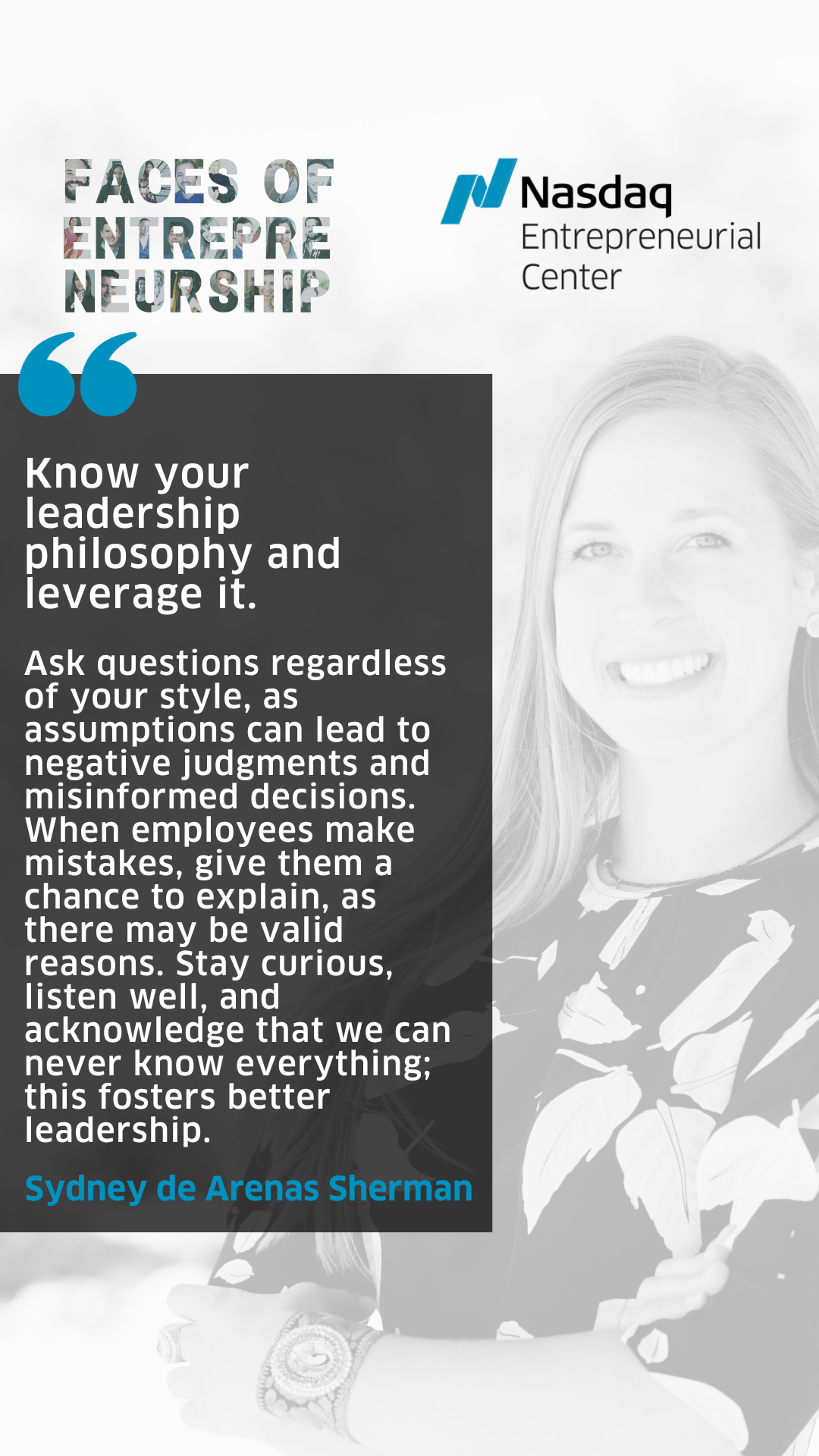 What does “entrepreneurship” mean to you?
What does “entrepreneurship” mean to you?
Sydney de Arenas Sherman: I define entrepreneurship as the mentality and method of seeing possibilities and coming up with original solutions to take advantage of them. It entails taking measured risks, taking charge of organizing and managing resources, and ultimately building a sustainable business or organization.
Tell us about your first experience with entrepreneurship.
SS: My parents being business owners exposed me to discussions about money, work, and business issues and opportunities from an early age. I vividly remember celebrating professional milestones with my family and being part of decision-making conversations.
I don’t know when the thought initially came to me, but as far as I can recall, I have always wanted to start my own business. There was no question in my mind that I would eventually make that happen.
What is your company’s origin story? What is the biggest reason you started your business? What did those early days look like and teach you?
SS: During my final year at The University of Texas, I interned at Narrative Edge, which eventually led to a business director role. However, my responsibilities included managing outbound sales, which I quickly discovered did not align with my interests or passions (or skills).
However, things took a positive turn when my boss asked me to manage events for the non-profit organization called TeXchange, where she was the president. I discovered I had a natural aptitude for this work and noticed many businesses and nonprofits needed part-time assistance because they couldn’t afford or didn’t need full-time employees. With my boss’s support, I took the leap and founded Admin Boutique to help organizations like TeXchange. Starting the business was a risk, but without family commitments at the time, I felt I had nothing to lose. In the first year, I earned just over $25,000, enough to meet my needs. Each year after that I earned a little more until the business began to do very well.
In the beginning, to stay focused, I established boundaries and a strict work routine. It took a few weeks of distraction (I was 23 at the time) to learn, but it wasn’t a huge challenge for me because I was always disciplined. Hiring, however, was always a challenge in the early years. Although I’ve since learned to foster loyalty, it was difficult to foster camaraderie with part-time contractors, which is the model for Admin Boutique. I also didn’t know how to hire well, and these were costly mistakes. I lost my first client, TeXchange, because of a hiring mistake. I have always loved travel and jumped on any opportunity to do so, and an opportunity arose shortly after I founded the company to move to Paris and London for the better part of a year. I had to quickly hire someone to work the TeXchange events and it was a pretty hefty miscalculation. On the other hand, I have never stopped traveling since and therefore gained a lot of skills in remote management and growth which was worth even the loss. We never know at the time of a decision how it will impact our future, but this turned out to be a decision that positively impacted the ultimate course of Admin Boutique.
These early experiences taught me that entrepreneurship is a continuous journey of learning and growth. I strongly believe that a business reflects its founder, and therefore, it’s not just professional growth that is required, but also personal growth. Early experiences taught me the importance of constant self-awareness, how to hire, and discipline in a constantly changing environment, although many more lessons have made up my entrepreneurial career since.
What do you wish you knew when you started? Is there anything you would do differently?
SS: I’ve always been a naturally trusting person, and I wish I had had a better sense of whom to trust in business when I first began. From a young age, I heard my father say: “trust but verify.” I enjoy trusting people and strive to see the best in them, but not everyone is motivated the same way I am, and I didn’t take his advice to heart until I had a very bad and costly experience. For me, money is just a means to an end – my true passion lies in helping people and growing sustainable businesses. Unfortunately, I got into a partnership with someone solely focused on making money, and it ended up completely ruining everything I had created at the time. This partner was insistent that we rush into the partnership, and looking back, it would have accomplished the same goals to partner in a much more temporary way at first before merging our businesses. I stopped trusting my instincts amidst the chaos and was worse for it in the end. There are times were merging immediately is necessary in business; however, there are often ways to achieve the same goals without going through a costly and permanent legal process that will prove impossible to extricate yourself from if things don’t go according to plan. If we had done it differently, I would have learned if she was trustworthy over time and wouldn’t have ended up losing so much. I would certainly have done this differently if I had been more experienced.
Another concept I wish I had understood thoroughly is that “quick fixes” don’t really exist. When I met the above-mentioned business partner, I was hoping she could rapidly solve a problem for me that I didn’t know how to solve for myself. I would have been much better off slowing down and learning how to solve the problem on my own, with thoughtfulness and dedication at the forefront of my actions.
Finally, it is easy to compare oneself to others, and I find that to be more harmful than helpful. When my businesses aren’t doing as well as I would like, it’s easy to look around and feel that others have it easy or they are better at business than I am. I have to remind myself that I don’t know their story and that overnight successes are a fallacy. It would be a better use of my time to get to know another founder’s journey and choices in order to learn from them, rather than taking whatever is digitally curated at face value.
Nowadays, if something is important to me, I make sure to verify that I can trust the person or situation, and I slow down enough to evaluate the motivations behind what I am trying to do. I go the extra mile to ensure my perspective is as accurate as possible through seeking multiple opinions, conducting tests or trials, consulting legal counsel, references, or data, or using a combination of strategies. And most importantly, and most challenging for me, I try to focus on learning instead of the end result because life and entrepreneurship are about how you get there as much as they are about where you end up.
What does “success” look like for you? We would love to hear your biggest, boldest dream. What do you think will help you achieve it?
SS: After a major setback in my business, I’ve grappled with what success truly means to me. Initially, I believed it was about owning companies perceived as successful by others. However, I soon discovered that this path is not easily attainable, nor does it guarantee personal happiness. Now, I see success as a mix of happiness, financial freedom, and the ability to balance work and family. It’s about enjoying life, growing personally, and being financially independent while running businesses that I care about. I will consider myself successful if I can operate businesses that enable me to relish life and cherish the people around me, while also fostering innovation, personal growth, and financial independence.
My BHAG [big hairy audacious goal] is to empower women in underdeveloped nations by providing them with access to financial security, good health, and overall well-being through well-paying jobs. The Etho was my initial venture towards this goal, followed by Montie & Joie. I aspire to make a significant impact. Living in a small Guatemalan town, I witness the importance of work, especially for women, when it offers fair pay and respect. A woman’s financial transformation not only affects her life but also that of her children and neighbors. Women are more likely to invest in their family and community, making investing in them highly impactful.
While I may require outside investment in the future to make the desired impact, my current focus is on being smart and strategic. To achieve my goals, I prioritize focus, intention, and clarity at this stage, which is much harder than it sounds! I am using very few resources to achieve very big goals.
Have you thus far raised any outside funding?
SS: Yes. I secured funding from private investors. Typically, investors prefer for entrepreneurs to approach friends and family for investment first to demonstrate genuine commitment, as it involves personal connections and motivates everyone involved to be as dedicated as possible (who wants to lose their grandmother’s investment?!).
Where do you meet investors?
SS: All my investors, except for my business partner, were from my personal network––family friends, friends of family friends, my parents’ professional network. I discovered my business partner after seeing her on a magazine cover featuring a company similar to mine. She introduced me to additional investors and public funds supporting businesses like ours. However, due to the pandemic, quasi-governmental entities redirected their investments to focus on supporting their own people, so we couldn’t proceed with those funds, but I am interested in pursuing this avenue in the future.
How has your network helped you in raising capital?
SS: My parents are successful entrepreneurs and investors. I am well aware that raising capital is challenging for everyone, but especially for women. Unfortunately, I know from experience, as I have had negative experiences with a few investors, one of whom behaved inappropriately. However, I consider myself fortunate to have a strong network that provided me with tremendous support.
Sadly, most women don’t have access to a network as valuable as the one I had through my family. I’ve met numerous women with amazing ideas struggling to secure funding. I hope for more female investors in the future, leading to more support for female-owned and operated businesses which will, in turn, produce a more balanced world.
Why have you decided not to fundraise?
SS: Most of my companies were bootstrapped. Taking someone else’s money entails a significant responsibility, so it’s crucial not to do it if you can’t offer the return they seek. In my case, I didn’t believe it was justified to accept money from others for most of my enterprises. This also implies that they probably wouldn’t have provided it even if I had asked.
Fundraising is a full-time job when you’re in it! I fundraised for about two years.
What is your superpower as an entrepreneur? What is your proudest and darkest moment so far? Share a key high and a key low from your journey if you can.
SS: My superpower in business is that I am very persistent. Despite the challenges I’ve faced in recent years, I remain determined to reach my dream of becoming an entrepreneur who has an impact on the world we live in. While it may have been easier to pursue a well-paying job, I am committed to my career path.
I believe strengths are also weaknesses, not always black or white, but rather a mix of both good and bad. Persistence has both contributed to my faults and showcased my best qualities. For example, persistence has meant that my husband and I, despite a plethora of obstacles, have finished a hostel, opened restaurants, and revamped old businesses. We have said yes to opportunities when we see them, despite how challenging it has been for us financially since 2020. We have scraped together what feels like money out of thin air to hit our goals, and now we are starting to see the light at the end of the tunnel, which is something I am immensely proud of because it has been much harder than every other business I have started.
On the other hand, not giving up contributed to some of the obstacles I am currently overcoming. It was doomed one way or another because of the poor choice in business partner that I have already mentioned, but there was a moment I had to save an important part of the business, yet I was so determined to see it through I let the opportunity pass right by me. An advisor suggested in April or May of 2020, when we had a significant amount of funding lined up for The Etho, that we should let all of our employees go and hibernate the business until the market stabilized and we could see the future clearly. I adored my employees and believed in our ability to weather the storm together; I wasn’t ready to give up.
Of course, what ended up happening is that none of the funding came through because they were quasi-governmental funds, and every government was investing in pandemic recovery at the time. So, we eventually had to let our employees go anyway. That was one of my saddest moments as a business owner. I knew that it was coming, but the worst part was that the business partner fired all of them without even talking to me, and so I was the last one to find out. I was close to the team, so I distinctly remember one of them calling me, and I cried more than she did (being pregnant did me no favors in that department). I will never forget the moment I had to make an active choice to do the inevitable, and I continue to try to learn the balance between my inherent strengths and weaknesses.
What are your personal driving principles, your top values? How have these personal principles and values shaped your company’s values and principles?
SS: The core principles that guide my decision-making within my businesses are rooted in connection, empowerment, and joy. These principles drive me to make moral and ethical choices that not only benefit my enterprises but also contribute positively to the lives of others.
Personally, my values are built upon a foundation of integrity, fostering meaningful connections, and promoting equality. These values provide the compass by which I navigate both my professional and personal journey.
How have the ideals and principles of your company been influenced by your own beliefs and values? Give us some illustrations.
SS: Because I believe that values should be integral to who you are, I chose values that I genuinely adhere to, rather than ones I am striving for. A business, in my opinion, reflects its creator in every way. The ideals I have mentioned form the foundation of my company, my day, and how I operate within my family. They are even printed out and live on the fridge. Regardless of someone’s role or performance, I treat everyone with respect. I also treat my clients with integrity, even if it means parting ways with discourteous ones.
At one time, discourteous clients represented a significant portion of our revenue at Admin Boutique. Although it was tempting to retain them for financial gain, it became crystal clear through our numerous interactions that they would never treat us with the respect we deserved, and I wanted more for my team. I was unwilling, regardless of the monetary implications, to subject my contractors to a position where they felt inferior, so I let all of those clients go! It was hard to regain the revenue from those clients, but we are a better business for it. It was also a great opportunity to show my team how I live the values I espouse.
At Montie & Joie, fostering connection is vital. I ensure that everyone feels included in our endeavors, both clients and artisans, creating a thread that unites the whole company. Beyond merely selling ethical products, I aim to introduce customers to diverse cultures and the women behind the products. Rejecting the notion of “otherness,” I believe that fostering connectedness can improve the world. Having lived in different countries and traveled extensively, I’ve learned that we share more similarities than differences, including our universal yearning for love and connection.
What is it like to work alone or with your partners?
SS: Admin Boutique is the only business where I operate without a partner. Despite challenging partnership experiences in the past, I still prefer collaboration over going solo. As a business owner, I shoulder unique responsibilities that can feel like a heavy burden. I take the responsibility of generating income seriously, as people’s income directly impacts their livelihoods. In most of my other organizations, my family (brothers, parents, husband, husband’s family) serve as my business partners. Working with relatives requires drawing boundaries between work and home, and it takes extra effort to maintain respect and professionalism in our interactions. Nevertheless, I highly value having my family as partners. We engage in open communication and encourage each other to excel because of the trust we share.
While some family partnerships may face unsuccessful challenges, I feel fortunate that everyone in my nuclear family gets along well and communicates effectively. I have also had my share of mediocre to terrible partnership relationships. In one instance, I was deceived, money was stolen, and unethical practices were employed. It was devastating and deeply impacted my business and self-worth. While I won’t go into specifics, it remains the most profound professional lesson I’ve learned. In my case, I was naive, but the experience taught me invaluable lessons.
In other more mild cases, the partners were not willing to put in the work and I was smart enough to let the partnerships fizzle before we signed the dotted line. In the future, if I consider partnering with someone I don’t immediately trust (i.e., not my family), I will proceed cautiously, seeking input from mentors and friends, and asking critical questions to ensure a strong foundation for the partnership. Learning from past experiences and being discerning when choosing whom to partner with is essential. But overall, I believe that great businesses are built with input from more than one person and there are many stand-up examples of businesses run effectively by partners.
Do you work with a mentor? What makes them useful to you and your business?
SS: My mentors all possess unique qualities that set them apart from me, and they’re further along in their entrepreneurial journeys, offering seasoned strategies for tackling challenges. While I don’t always follow their advice, learning from those who have paved the way has been invaluable. One of the greatest benefits of having mentors is gaining an outside perspective on my business, as they can point out blind spots that I may miss when my vision is too close to the situation. Their insights help me consider different paths and opportunities that lead to success.
I have also mentored others, although I feel that I will be a more valuable mentor once I overcome a few of the hurdles that still lie ahead.
What function does mentoring serve in your life (as a mentor or mentee)?
SS: While I’ve been an official mentor through an organization for teens pursuing a technology career and another for human trafficking survivors who want to start businesses, I’ve also offered informal mentoring to people in my network starting businesses. However, I primarily consider myself a mentee, continuously seeking opportunities to learn from others. I’ve been fortunate to have both intentional and unintentional mentors throughout my journey. Diversity in mentors is crucial, and I’ve made a conscious effort to seek guidance from individuals with varied cultures, backgrounds, experiences, and ages. I would say that after overcoming so many obstacles, I have learned to value the advice and time of my mentors even more than I did before, which in turn gives their efforts even more of an impact in my decision-making abilities as a business owner.
Many entrepreneurs continue to perfect their daily routines to support their work and greater vision; would you mind sharing your morning routine or a regular ritual that grounds your work each day?
SS: Each morning, I prioritize my health by taking vitamins to support my body, which has been through two physically demanding, back-to-back pregnancies. I also stretch early in the morning with my toddler for two minutes. While neither seems world-altering, it is more about following through on the commitment I made to myself to focus on my well-being before anyone else’s. If it were up to me, I would have at least five cups of coffee, but I refrain and instead practice a five-minute meditation, visualizing myself from the perspective of others (and then sometimes drinking five cups of coffee).
Seeing myself through the eyes of someone who loves me boosts my confidence and positively impacts my day because we are always hardest on ourselves, so taking that perspective away for even just a few minutes is impactful. Some days, when I have more time, I write free form about my dreams, vision, and goals. I let myself see me as a successful, happy, and healthy person, connecting me to the world at large instead of staying stuck in my day-to-day. It helps me gain perspective as what we struggle with today is important, but only temporarily, and I seek to remember that in order to make better and bigger choices for myself and my family.
What are you reading or have read?
SS: I am reading How To Do The Work, It’s Never Too Late To Sleep Train (don’t even get me started on that), and Tomorrow and Tomorrow and Tomorrow. I am an avid reader, constantly immersing myself in books for both enjoyment and personal growth in my career. Because I have two babies, I mostly listen to audiobooks and I devour them.
Where do you turn for inspiration?
SS: Conversations with others and exploring new places are my greatest sources of motivation. They liberate my mind from the monotony of the everyday routine. Splitting our time between Guatemala and NYC offers a fresh perspective, allowing me to see the world through different eyes. Furthermore, traveling and experiencing the world hold immense significance in my life, as I have learned the most by getting to know other cultures. I have been to about a quarter of the world’s countries, and my perspective of myself, the world, and nearly everything, has been significantly impacted because of that.
Do you have a favorite quote, mantra, or words of wisdom to get through the tough days?
SS: This quote encompasses how I view the world and reflects my love for adventure: “You can’t stop the waves, but you can learn to surf.” – Jon Kabat-Zinn.
What is a problem that keeps you up at night?
SS: Unfortunately, my son regularly keeps me up at night (hence the sleep training book). I usually only get 5-6 hours of sleep, which is tough. Aside from that, I don’t like conflict, so I stay up thinking about any relationship issues I have. On the financial front, we have more money going out than coming in, which is a major stressor, so there are nights when I overthink how to tackle the financial needs of the day in front of us.
How do you feel about using your profession to help others?
SS: The driving force behind establishing my businesses was the desire to make a positive impact on the lives of others. A significant trip to Austria opened my eyes to the unequal distribution of opportunities in the world, which I hadn’t fully understood while growing up in an affluent Houston neighborhood. I studied Media and Global Change with students from all over the world, and this experience fueled my desire to make a difference and support those less fortunate in accessing opportunities. Through meeting these people, I decided to travel around the world, and I saw what it held for most people: significant gaps in opportunity. Most of my businesses are dedicated to ethical production or dealing in ethical goods, and all committed to providing fair wages.
What advice do you have for fellow (and aspiring) entrepreneurs building and leading teams?
SS: Know your leadership philosophy and leverage it. Ask questions regardless of your style, as assumptions can lead to negative judgments and misinformed decisions. When employees make mistakes, give them a chance to explain, as there may be valid reasons. Stay curious, listen well, and acknowledge that we can never know everything; this fosters better leadership.
Also, try to make as much progress as you can while investing as little as you can. Money goes so much faster than you think it will, and if you spend it before you understand your business, customers, and market, you will regret it! You can only effectively manage your team if you have money to pay them and aren’t overly worried about your bank account.
What kind of an entrepreneur do you want to be known as – as in, what do you want your legacy to be?
SS: My desire is to be acknowledged for utilizing ethical trade to improve the lives of others. I am determined to create a significant impact on people’s well-being and contribute to the advancement of the ethical trade industry, specifically for artisan women.
Do you have someone you’d like to nominate to be profiled in our Faces of Entrepreneurship series? Please let us know by emailing media@thecenter.nasdaq.org or submitting your nomination using this form.
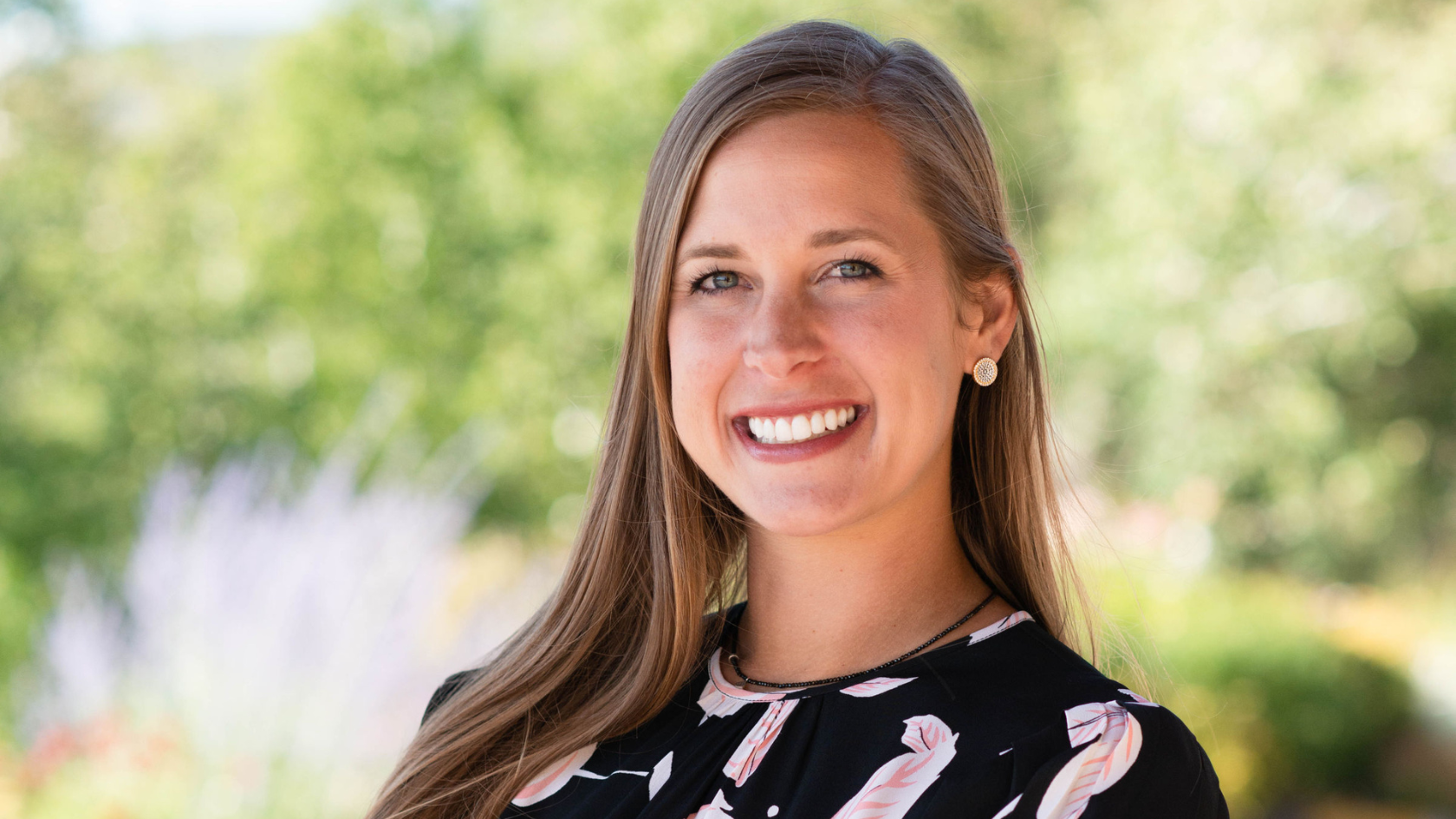
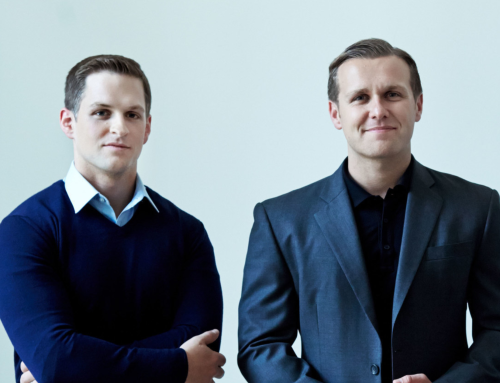
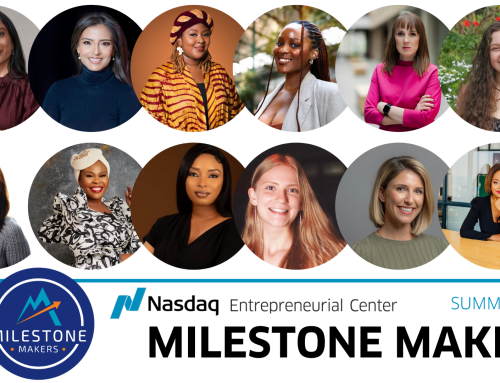
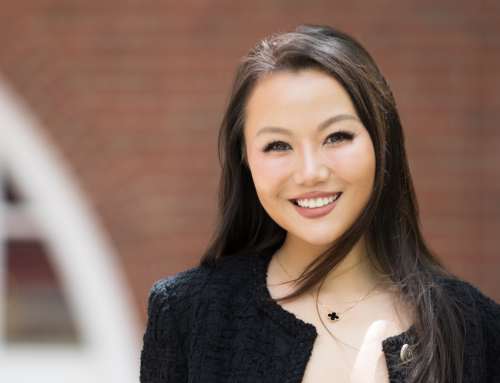
Invite a Friend
Close